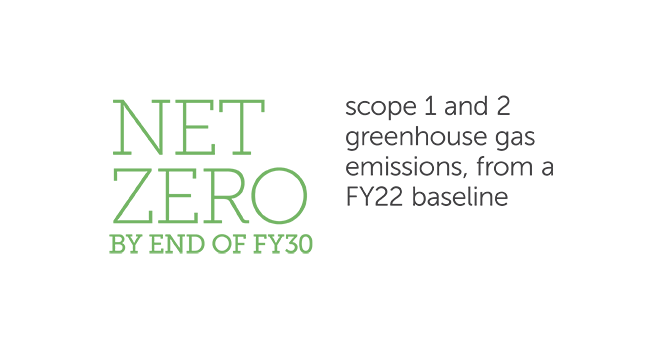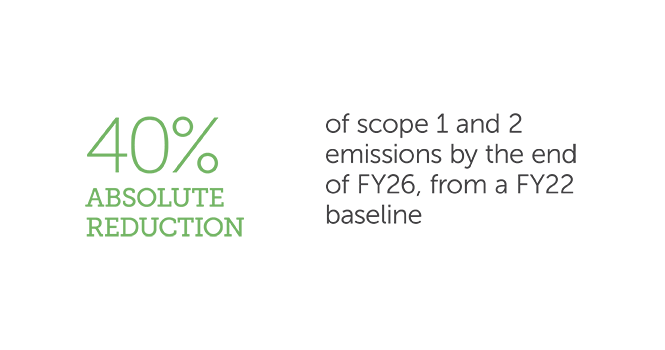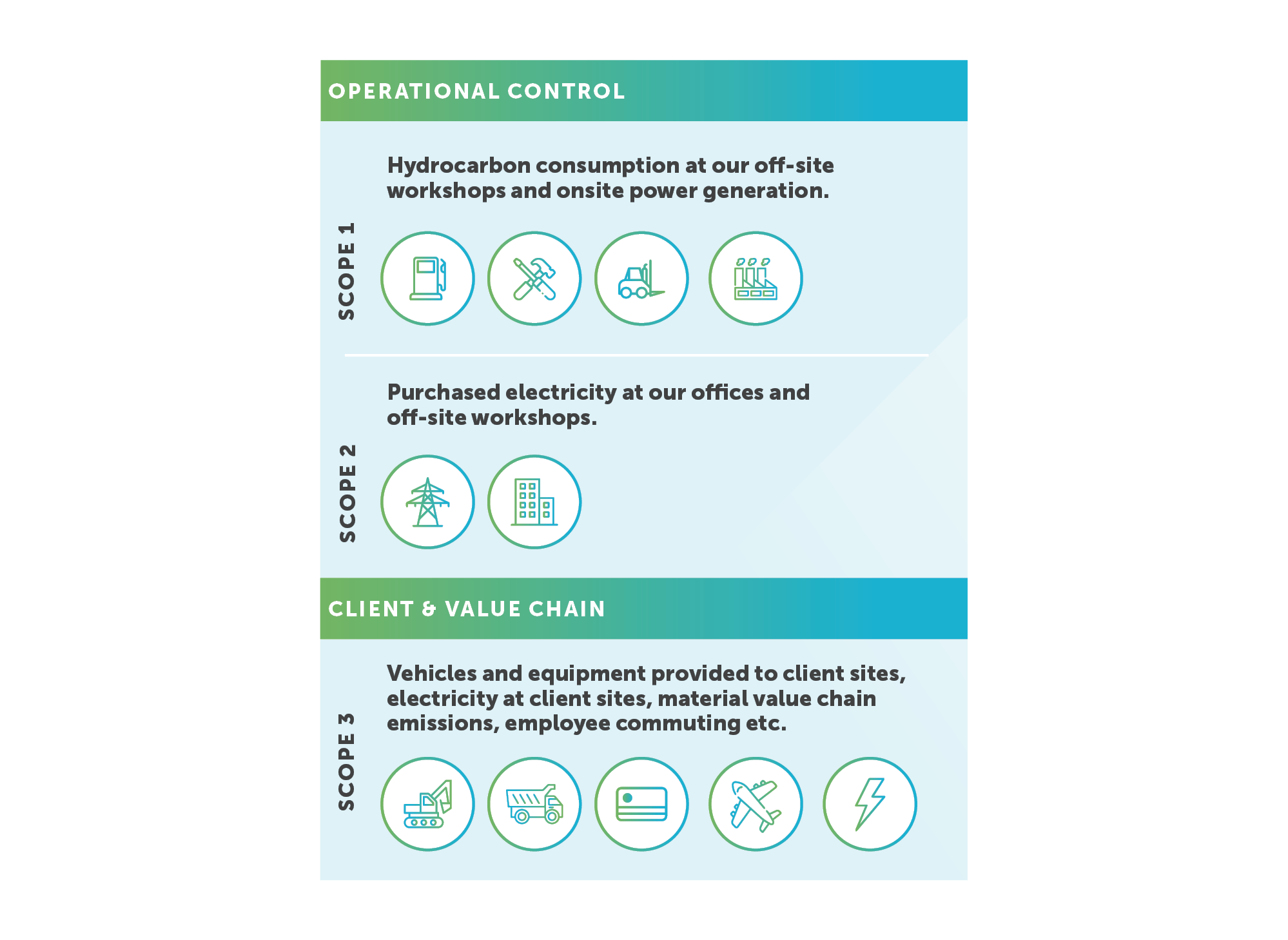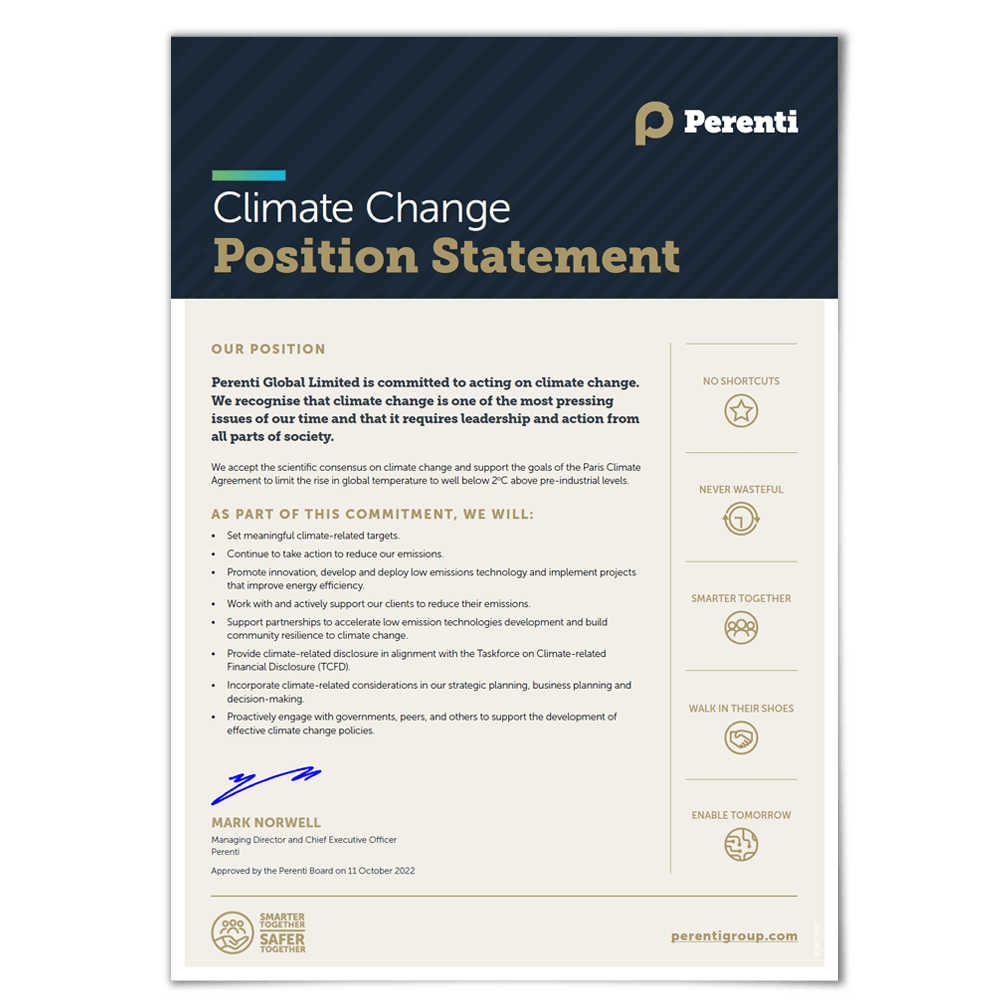Sustainability
Environment
We recognise that climate change can affect our businesses through changes in environmental conditions, such as an increase in severe weather events, or through changes in the business environment due to the transition to a low carbon economy.
We recognise the mining industry has a critical role in helping the world transition to a more sustainable future.

Perenti has identified and qualitatively assessed the physical and transitional climate-related risks and opportunities associated with climate change over different time horizons in accordance with TCFD recommendations.

Electrification
The mining sector is critical for producing the minerals needed for a low carbon future, yet at the same time needs to reduce its contribution to atmospheric greenhouse gases.
We believe we must play our part to help decarbonise the industry while continuing to provide services that are essential for economic growth and provision of commodities that will enable decarbonisation. We are leading the way in decarbonising mines.
Our emissions

It is important to differentiate and quantify our Scope 1, Scope 2 and Scope 3 emissions to enable us to prioritise our decarbonisation efforts. The three levels of the scope illustrate greenhouse gas emission sources within our operational footprint and value chain.
Since 2020 we have calculated and disclosed greenhouse gas emissions under our operational control. We are progressively calculating and disclosing our value chain greenhouse gas emissions. Please refer to our latest sustainability report for disclosure of our emissions.
Taskforce on climate-related financial disclosures
Climate change and carbon emissions continue to be a material issue for our business. Perenti considers transparency in climate change response and management practices to be a fundamental practice in the collective fight against climate change.
Perenti supports the Task Force on Climate-related Financial Disclosures (TCFD) as a framework to increase reporting of climate-related financial information. We are progressively increasing reporting to the TCFD requirements and will continue to monitor developments in this space.
The Board Safety and Sustainability Committee has oversight of climate-related issues at Perenti, including carbon emissions reduction and climate change risk management. The Safety and Sustainability Committee Charter can be accessed here.
The Chief People and Sustainability Officer has overall responsibility for ensuring climate change risks and opportunities are assessed and managed. Accountability for specific climate-related risks and opportunities are allocated to relevant roles within the business.
The Board and Group Executive Committee has received climate change training to enable informed consideration of climate-related issues. Both the Board Safety and Sustainability Committee and Group Executive Committee are informed of climate-related issues at least annually during the annual risk review, or as often as required through regular Board Committee meetings or Group Executive Meetings.
A Decarbonisation Steering Group, co-sponsored by our Chief Financial Officer and Chief Legal and Risk Officer, is comprised of representatives from across the Company to provide oversight and support to our decarbonisation activities.
Perenti recognises that climate change can affect our businesses through changes in environmental conditions, such as an increase in severe weather events, or through changes in the business environment due to the transition to a low carbon economy.
Perenti has identified and qualitatively assessed the physical and transitional climate-related risks and opportunities associated with climate change over different time horizons in accordance with TCFD recommendations.
The risks and opportunities of climate change are also considered as part of the Board’s strategy framework. You can read more about our response to physical and transitional impacts of climate change in our sustainability report. We will build on the qualitative scenario analysis to undertake financial impact assessment of climate-related issues.
Perenti’s approach to managing climate-related risk is integrated into our overarching risk management framework, which is aligned with ISO 31000:2018 and the ASX Principles and Recommendations. Climate-related risks are identified and assessed using scenario analysis methodologies aligned to the TCFD recommendations and includes cross functional input from across the business.
We also regularly assess climate risks as part of the enterprise risk suite, considering factors such as impact, likelihood, critical control effectiveness and actionable measures. Perenti’s risk framework outlines enterprise risks as those risks that hold significance at a Group level, considering factors such as materiality, strategic time horizon and applicability across the broader Group. The management of enterprise risks falls under the purview of the Group Executive Committee, with the Board providing effective oversight. The Board’s Audit and Risk Committee is responsible for monitoring the overall effectiveness of our risk management framework.
The Group has also set greenhouse gas emission reduction targets and included greenhouse gas emission reduction measures in the Short-Term Incentive Program. The Decarbonisation Steering Group provides oversight and support to our decarbonisation activities. Decarbonisation activities to date include investment in solar panels and purchasing of renewable energy for workshop and office facilities, and the continued investment in low emission mining fleet for our operations.
Perenti has disclosed scope 1 and 2 emissions since 2020 and is progressively disclosing relevant scope 3 emissions categories. We have set scope 1 and 2 emissions reduction targets using a bottom-up approach by reviewing our greenhouse gas inventory and conducting a decarbonisation levers assessment to identify and prioritise the most effective options to reduce carbon emissions within Perenti’s business context. These emission reduction targets are incorporated into the Short-Term Incentive Program. All greenhouse gas metrics and targets are published in the annual reporting suite.
We have undertaken third party pre-assurance of scope 1, scope 2 and select scope 3 emissions categories in preparation of assurance requirements in future reporting years.
Climate change position statement
We recognise that climate change demands urgent action. Climate change is one of the major issues of our time, requiring genuine leadership from all actors – government, civil society and the private sector.
Our Climate Change Position Statement outlines our recognition of the science of climate change and ongoing commitment to manage the risks and minimise the impacts and associated with a changing climate.

